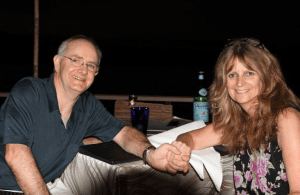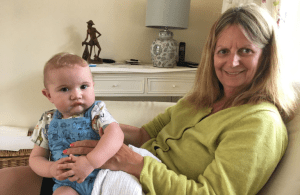The need for greater age-appropriate support
Steve – who cares for his wife Julie – explains what needs to change to ensure better representation and support for younger people who are affected by dementia.
My wife Julie was in her early 50s when she was diagnosed with young onset Alzheimer’s disease. She was still capable of doing lots of things and wanted to do as much as she could before the dementia progressed. She really wanted to meet or at least talk to other people who had been affected by dementia at a younger age – but it was a challenge to do this.
A lot of changes occur as the condition progresses; Julie had already retired by the time of her diagnosis and, whilst still otherwise healthy, today she is not able to communicate with her two-year-old grandchildren due to worsening symptoms. Adapting our house and ways of living to suit Julie’s changing needs and monthly care costs are expensive.
Now, almost eight years from diagnosis, Julie is still six years away from pension entitlement; prescriptions only became free this year upon her 60th birthday. She has some financial support from Personal Independence Payments, but entitlement for that relies on good understanding of young onset dementia amongst assessors. The need for more support is clear.

Julie
A lack of support for younger people
Soon after Julie’s diagnosis, we contacted three support groups in our local area. We learned that the average age of people in the groups was over 75, their weekly meetings centred around tea and biscuits, reminiscing (about times before Julie was born) and singing along to old-time music such as ‘White Cliffs of Dover’. This wasn’t at all appropriate for Julie; she wanted to meet someone with Alzheimer’s disease of a similar age to her and at that time her favourite singalong would be to Lady Gaga rather than Vera Lynn.
Nonetheless, she decided she would like to pop along to a meeting in Aylesbury to try and engage, regrettably she was then told that she had to be accompanied to the centre. At that stage in her dementia, Julie was still perfectly capable of driving and didn’t want anyone to accompany her; she wanted to be independent and to discover things for herself. She was really upset that there was nothing that could be offered to her. Not having those support services for younger people made us decide to manage our own lives as best as we could.

Steve and Julie enjoying evening refreshments by the beach on holiday in 2015
Digital support key
For Julie, that management did not come without its challenges. I was still working then and, left alone with her laptop and iPad, I would come home to find her crying as she would read about the different stages of dementia and what life might become like. Some of the information on the internet on dementia is conflicting and naturally Julie picked up on the worst-case outcomes.
But it’s this access to digital support which is key. Julie is of the generation where the computer is her way of communicating – she needed a regulated online network of like-minded people and resources that she could engage with in her own way.
Compassion as the bedrock
The foundation of age-appropriate services has to be compassion. I have seen it in the carers who come and see Julie every week and respond to her needs in the most individual way, engaging her delicately to find out what she enjoys and is still able to do. Compassion is already there in everyone but a better awareness of peoples’ difficulties needs to be cultivated more widely. Every person with young onset dementia is an individual who deserves the best hopes, understanding, care and financial support that society can provide.

Julie with her grandson, Henry, in 2019
Steve’s checklist for age-appropriate services
Caring for Julie over the years has made us both clearly realise what is missing in tailored young onset dementia care. Here is our checklist for what we would like to see introduced:
- Wider acknowledgement and understanding of dementia as a disability affecting all ages, as per the Equality Act 2010. If you see someone in their 50s struggling to remember their pin in the supermarket, people should consider that person’s difficulty and the possibility that the person has dementia
- The cross-party Government working group on dementia to look more closely at the needs of people and families affected by young onset. This would lead to wider understanding that the family and financial commitments which people go through are very different for younger people, and could tackle questions around funding for support
- More regulated online networks for people affected by young onset dementia to interact and share resources. It’s a big issue for those who live with it. The Young Dementia Network provided by Dementia UK I know can help in this regard
- Age-appropriate care services run and developed by younger people and carers with an open mind, and who are willing to give themselves to the person and find out what engages them and makes them who they are. The support group which Admiral Nurse Amy Kerti set up has been vital in this regard; she provided the conduit to connect with other people going through similar challenges to us.
